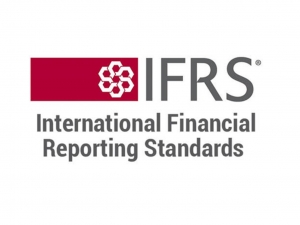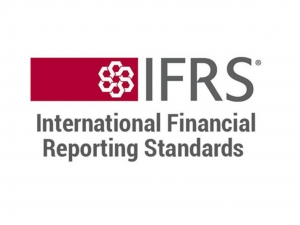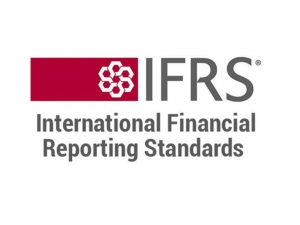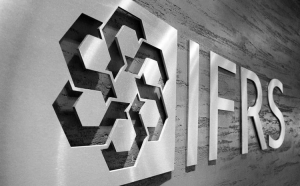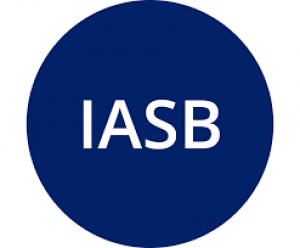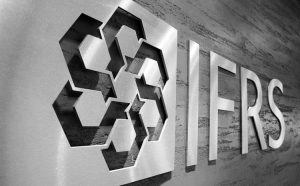عرض العناصر حسب علامة : IASB
يصدر مجلس معايير المحاسبة الدولية تعديلات ضيقة النطاق على متطلبات معاملات البيع وإعادة التأجير
أصدر مجلس معايير المحاسبة الدولية (IASB) اليوم تعديلات على المعيار الدولي لإعداد التقارير المالية رقم 16 عقود الإيجار، والتي تضيف إلى المتطلبات التي توضح كيفية قيام الشركة بالمحاسبة عن البيع وإعادة التأجير بعد تاريخ المعاملة.
ينشر مجلس معايير المحاسبة الدولية (IASB) مقترحات لتحديث معيار المحاسبة الخاص به للكيانات الصغيرة والمتوسطة الحجم
نشر مجلس معايير المحاسبة الدولية (IASB) التابع لمؤسسة IFRS اليوم مقترحات لتحديث المعايير المحاسبية الدولية لإعداد التقارير المالية للمنشآت الصغيرة والمتوسطة لتعكس التحسينات التي تم إجراؤها على المعايير المحاسبية الدولية لإعداد التقارير المالية الدولية، مع الحفاظ على المعيار مناسبًا للكيانات الصغيرة والمتوسطة الحجم.
مقالات المعالجة المحاسبية لإيرادات شركات ومكاتب تدقيق الحسابات وفقاً للمعيار الدولي لإعداد التقارير المالية 15
رسالة دكتوراه: متطلبات تطوير الممارسات المحاسبية في الجزائر في ظل تبني المرجعية المحاسبية الدولية
لعب الإصلاح المحاسبي دورا بارزا في تغيير واقع الممارسة المهنية المحاسبية في الجزائر، فبعد أن كانت في أحضان المخطط المحاسبي الوطني (PCN) الذي كان يستجيب لدواعي الاقتصاد الموجه.
تحديث IASB يوليو 2022
يسلط تحديث مجلس معايير المحاسبة الدولية الضوء على القرارات الأولية الصادرة عن مجلس معايير المحاسبة الدولية (IASB).
رسالة ماجستير: تطبيق المعايير الدولية المحاسبية المالية وأثرها على المؤسسة الاقتصادية
تلعب المحاسبة دوراً كبيراً في اقتصاديات الدول، حيث تعد المصدر الأكثر وثوقاً للحصول على المعلومة، التي ازداد الطلب عليها في الآونة الأخيرة كماً ونوعاً، وحسب طبيعة وأهمية هذه الأخيرة في اقتصاديات الدول، يختلف النظام المحاسبي من دولة إلى أخرى، فهناك من يرى أن المحاسبة وجدت من أجل المراقبة وحساب الوعاء الضريبي وهذا من أجل خدمة الدولة، حيث نجدها موجهة من طرف السلطة العمومية، وهناك من يرى أنها قاعدة لبناء نظام معلوماتي يساعد على التسيير الجيد واتخاذ القرار الصحيح حيث نجد لدى هؤلاء أن المحاسبة منظمة من طرف المهنيين في هذا المجال، لذلك نجد اختلافاً كبيراً بين العديد من النظم المحاسبية في العالم حتى وإن كانت تشترك في العديد من المبادىء المحاسبية الأساسية.
رسالة دكتوراه: انعكاسات تطبيق معيار المحاسبة المصري للمنشآت الصغيرة والمتوسطة على قيمة المنشآت الصغيرة والمتوسطة
تعد المنشآت الصغيرة والمتوسطة رکيزة أساسية فى اقتصاديات العديد من الدول وبخاصة الدول النامية، ونظراً لذلک فقد زاد اهتمام المجالس المهنية الواضعة للمعايير المحاسبية بتلک المنشآت وخاصة مجلس معايير المحاسبة الدولى IASB والذى أصدر المعيار الدولى لإعداد التقارير المالية للمنشآت الصغيرة والمتوسطة فى عام 2009
تحديث مجلس معايير المحاسبة الدولية IASB لشهر يناير 2022
يسلط تحديث IASB هذا الضوء على القرارات الأولية لمجلس معايير المحاسبة الدولية (IASB). يمكن الاطلاع على المشاريع المتأثرة بهذه القرارات في خطة العمل. يتم التصويت على قرارات مجلس معايير المحاسبة الدولية النهائية بشأن معايير IFRS والتعديلات وتفسيرات IFRIC رسميًا على النحو المنصوص عليه في دليل الإجراءات القانونية لمؤسسة IFRS.
معلومات إضافية
-
المحتوى بالإنجليزية
Work plan overview
IASB work plan update (Agenda Paper 8)
The IASB met on 25 January 2022 to:
receive an update on its work plan; and
discuss the approach to prioritising matters arising from post-implementation reviews.
IASB work plan update (Agenda Paper 8)
The IASB received an update on its work plan. The update included plans for the IASB:
to discuss the plan for its Management Commentary project in the second quarter of 2022, after it has discussed feedback on the Exposure Draft Management Commentary. In discussing that plan, the IASB will consider the implications of the IFRS Foundation Trustees’ decision to create the International Sustainability Standards Board and consider advice from stakeholders that the work of the two boards should be connected and cooperative.
to discuss aspects of its Goodwill and Impairment project in the first half of 2022, prioritising:
the package of disclosure requirements about business combinations described in the Discussion Paper Business Combinations—Disclosures, Goodwill and Impairment; and
the analysis of specific aspects of the feedback on the subsequent accounting for goodwill.
The IASB was not asked to make any decisions.
Approach to prioritising matters arising from post-implementation reviews (Agenda Paper 8A)
The IASB discussed the approach to prioritising and responding to matters identified in post-implementation reviews.
Eleven of 12 IASB members agreed with the approach.
Next step
The IASB expects to receive the next update on its work plan by May 2022.
Research and standard-setting
Primary Financial Statements (Agenda Paper 21)
The IASB met on 25 January 2022 to redeliberate some of the proposals in the Exposure Draft General Presentation and Disclosures relating to:
management performance measures—disclosures—usefulness and reconciliations (Agenda Paper 21A); and
management performance measures—disclosure of tax and non-controlling interests (NCI) (Agenda Paper 21B).
Management performance measures—Disclosures—Usefulness and reconciliations (Agenda Paper 21A)
The IASB tentatively decided:
to confirm the proposed requirement for an entity to disclose why a management performance measure communicates management’s view of performance, subject to some drafting considerations relating to the terms ‘why’ and ‘how’, including an explanation of:
how the management performance measure is calculated; and
how the measure provides useful information about the entity’s performance.
All 12 IASB members agreed with this decision.
to confirm the proposed requirement for an entity to disclose a reconciliation between a management performance measure and the most directly comparable subtotal or total specified in IFRS Accounting Standards. All 12 IASB members agreed with this decision.
to provide additional application guidance to support the proposed requirement described in (a). The guidance would clarify that, where doing so would be necessary for a user of financial statements to understand why a management performance measure communicates management’s view of performance, the explanations described in (a)(i) and (a)(ii) would refer to the individual reconciling items. All 12 IASB members agreed with this decision.
to require an entity to disclose, for each reconciling item, the amount(s) related to each line item(s) in the statement(s) of financial performance. Eleven of 12 IASB members agreed with this decision.
Management performance measures—Disclosure of tax and NCI (Agenda Paper 21B)
The IASB discussed feedback on the proposal in the Exposure Draft to require an entity to disclose the effects of tax and non-controlling interests for individual items in the reconciliation between a management performance measure and the most directly comparable subtotal or total specified in IFRS Accounting Standards. The IASB made no decisions. It asked for further information about entities that already disclose the tax effects of such reconciling items; in particular, how they calculate the tax effect.
Next step
The IASB will continue to redeliberate the project proposals at future meetings.
Business Combinations under Common Control (Agenda Paper 23)
The IASB met on 25 January 2022 to complete its discussion of feedback on the remaining topics from the Discussion Paper Business Combinations under Common Control. The IASB discussed feedback on how an entity should apply the acquisition method and a book-value method to business combinations under common control, and the related disclosures an entity should be required to make. The IASB was not asked to make any decisions relating to this feedback.
The IASB also discussed a plan for deliberating proposals based on the preliminary views in the Discussion Paper.
Next step
The IASB will begin deliberating the proposals at a future meeting.
Maintenance and consistent application
Maintenance and consistent application (Agenda Paper 12)
The IASB met on 25 January 2022 to discuss the Lack of Exchangeability project and to consider matters discussed at the November 2021 IFRS Interpretations Committee (Committee) meeting.
Lack of Exchangeability (IAS 21): Feedback Summary (Agenda Paper 12A)
In April 2021 the IASB published the Exposure Draft Lack of Exchangeability, which proposed amendments to IAS 21 The Effects of Changes in Foreign Exchange Rates. The comment period ended in September 2021. At the January 2022 meeting the IASB discussed a summary of feedback on the Exposure Draft.
The IASB was not asked to make any decisions.
Next step
The IASB will consider the project’s direction at a future meeting.
IFRIC Update (Agenda Paper 12B)
The IASB received an update on the Committee’s November 2021 meeting. Details of this meeting were published in IFRIC Update November 2021.
The IASB was not asked to make any decisions.
Taxonomy
IFRS Taxonomy Update—Initial Application of IFRS 17 and IFRS 9―Comparative Information (oral update)
The IASB met on 25 January 2022 to receive an update on the feedback on the proposed IFRS Taxonomy update resulting from Initial Application of IFRS 17 and IFRS 9―Comparative Information, which amended IFRS 17, issued in December 2021. The IASB was also updated on the next steps to be taken in finalising the IFRS Taxonomy update.
The IASB was not asked to make any decisions.
Next step
The IASB will begin the balloting process and expects to issue IFRS Taxonomy 2021—Update 3 Initial Application of IFRS 17 and IFRS 9―Comparative Information in March 2022.
" المحاسبة في عالمنا المعاصر" من ذاكرة المجمع الدولي العربي للمحاسبين القانونيين
تحديث المعايير الدولية لإعداد التقارير المالية (IFRS) للشركات الصغيرة والمتوسطة لشهر ديسمبر 2021
تحديث المعايير الدولية لإعداد التقارير المالية للمنشآت الصغيرة والمتوسطة هو ملخص فريق العمل للأخبار والأحداث والمعلومات الأخرى حول معايير IFRS للشركات الصغيرة والمتوسطة وأنشطة الشركات الصغيرة والمتوسطة ذات الصلة. لم تتم مراجعة ملخص فريق العمل من قبل مجلس معايير المحاسبة الدولية (IASB).
معلومات إضافية
-
المحتوى بالإنجليزية
December 2021 IFRS for SMEs Update
The IFRS for SMEs Update is a staff summary of news, events and other information about the IFRS for SMEs® Standard and related SME activities. The staff summary has not been reviewed by the International Accounting Standards Board (IASB).
This edition of the IFRS for SMEs Update includes:
an update on the planned 2022 meetings of the SME Implementation Group (SMEIG);
a reminder of online resources for SMEs; and
a note from Ayodele Ojo, a member of the SMEIG.
Further information about the IFRS for SMEs Standard
The IFRS for SMEs Standard online (available in multiple languages)
The IFRS for SMEs Standard in hard copy
Procedure for submitting implementation issues on the IFRS for SMEs Standard
SME Implementation Group
Supporting material
Past copies of the IFRS for SMEs Update
Update on the planned 2022 meetings of the SMEIG
The SMEIG is expected to meet:
in January 2022, to discuss some remaining topics in the scope of the second comprehensive review of the IFRS for SMEs Standard. The agenda papers will be available shortly on the SMEIG meeting page.
in the second half of 2022, to share preliminary feedback on the exposure draft of proposed amendments to the IFRS for SMEs Standard.
Reminder of online resources for SMEs
The IFRS Foundation provides educational materials to support the implementation and application of the IFRS for SMEs Standard. These materials are available on the Supporting materials for the IFRS for SMEs Standard page and include:
webcasts, podcasts and webinars; and
articles and other publications.
The IFRS Foundation has also made available a package of 35 supporting modules to help those who wish to learn more about the IFRS for SMEs Standard, particularly those who apply the Standard and users of financial statements that are prepared in accordance with the Standard.
Note from Ayodele Ojo, SMEIG member
Ayodele Ojo is a Finance Manager at Lotus Capital Limited, Nigeria.
Accounting Standards in Nigeria
The Financial Reporting Council (FRC) of Nigeria is statutorily responsible for, among other things, developing and publishing the accounting and financial reporting standards to be observed in the preparation of financial statements of public entities in Nigeria and for related matters.
On the Road map to the adoption of IFRS Standards, the FRC required all small and medium-sized entities in Nigeria to apply the IFRS for SMEs Standard when preparing their financial statements for the year ended 31 December 2014.
It is disappointing to note that despite the IFRS for SMEs Standard being simple, more relevant as well as less costly to apply, not many entities apply the IFRS for SMEs Standard in Nigeria in the preparation of their financial statements. The reason being attributed to the lack of awareness of the possible benefits of applying of the Standard.
The second comprehensive review of the IFRS for SMEs Standard
The IASB recently consulted on the approach to take in updating the IFRS for SMEs Standard to reflect developments in the requirements of full IFRS Standards.
In January 2020, the IASB published a Request for Information on the Second Comprehensive Review of the IFRS for SMEs Standard discussing the alignment approach, which is to continue to develop the IFRS for SMEs Standard based on the principles of IFRS Standards.
In addition to the usual means of providing feedback, such as comment letters and outreach meetings, the IASB gave the possibility to users of SMEs’ financial statements to provide feedback using an online survey (user survey) and additional interviews were carried out with users of SMEs’ financial statements. The Request for Information was open for comment for 270 days. During this period, the IASB received 54 completed user surveys from America, Asia-Oceania, Europe and Africa. Africa accounted for only 10% of the responses.
Feedback from users of SMEs financial statements on aligning the IFRS for SMEs Standard with full IFRS Standards
The feedback obtained on the alignment approach showed divergent views on whether the IFRS for SMEs Standard should be aligned with full IFRS Standards. Supporters of the alignment approach said alignment would ease an entity’s transition to full IFRS Standards when the entity is ready to apply full IFRS Standards. Respondents who disagreed with the alignment approach were concerned about introducing complexity to the Standard, which could place unnecessary pressure on SMEs’ resources.
Overall, the feedback showed that the majority of the stakeholders favoured continuing to align the IFRS for SMEs Standard with full IFRS Standards.
In February 2021 and September 2021, the SMEIG—which supports the global adoption of the IFRS for SMEs Standard and its maintenance—held virtual meetings to discuss the feedback on the Request for Information and make recommendations to the IASB for updating the IFRS for SMEs Standard.
In the light of the feedback and the recommendations from SMEIG members, the IASB agreed:
to continue to base the IFRS for SMEs Standard on full IFRS Standards;
to consider the costs and benefits of aligning the IFRS for SMEs Standard with a new IFRS Standard, amendment to an IFRS Standard or IFRIC Interpretation;
to develop any proposed amendments to the IFRS for SMEs Standard to reflect the principles and important definitions in a new requirement; and
to determine whether and how the IFRS for SMEs Standard should be aligned with full IFRS Standards using the principles of relevance to SMEs, simplicity and faithful representation, and including cost-benefit considerations when applying those principles.
IASB discussions so far
The IASB has started discussing specific sections of the IFRS for SMEs Standard that could be aligned with new requirements in IFRS Standards in the scope of the second comprehensive review, such as new requirements for financial instruments, revenue and leases.
The IASB’s tentative decisions so far have been reported in the monthly IASB Updates and are summarised in this document.

